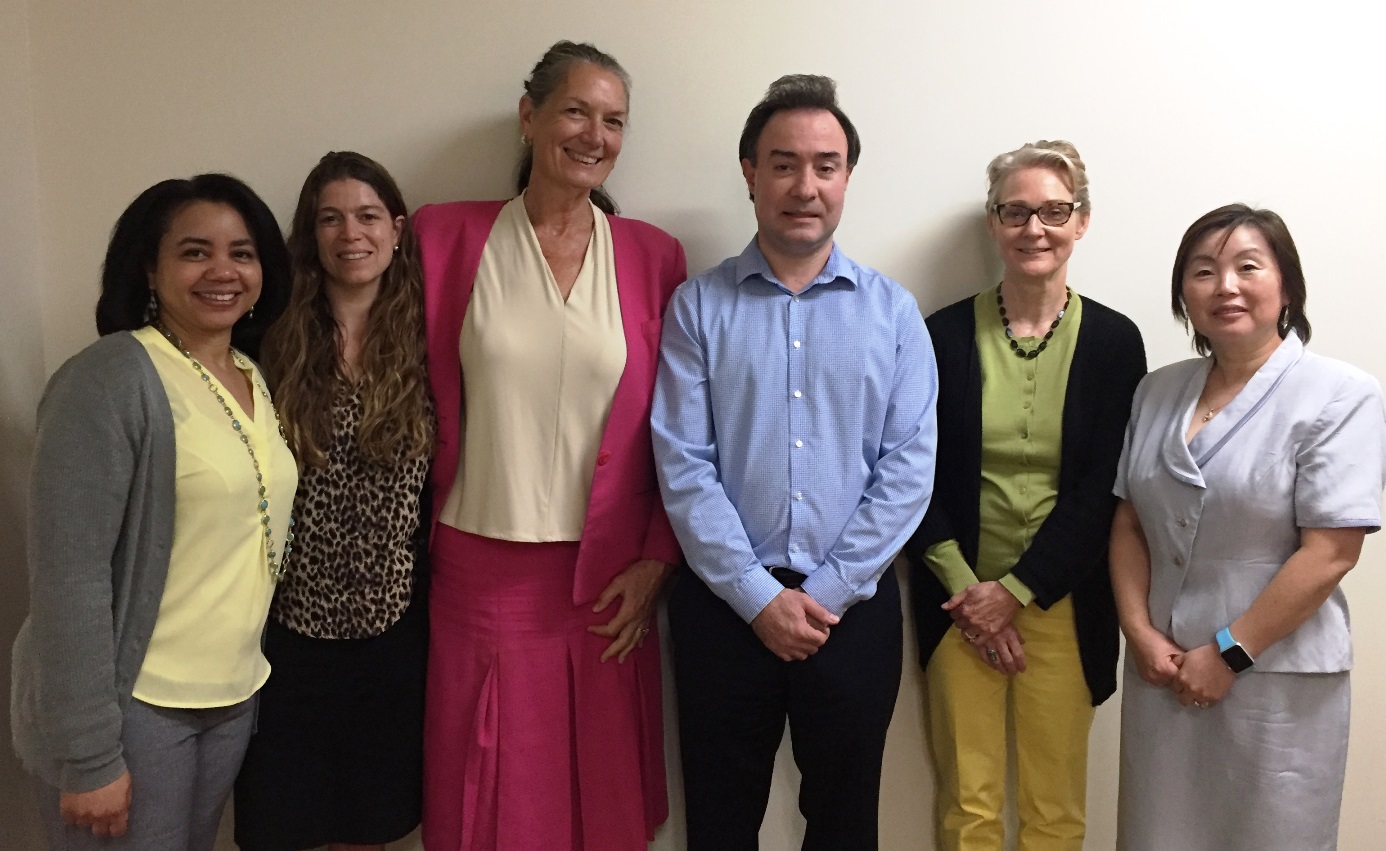
Pictured from left are Rhonda Dailey, M.D.; Elizabeth Towner, Ph.D.; Julie Gleason-Comstock, Ph.D., M.C.H.E.S.; Dennis Tsilimingras, M.D., M.P.H.; Anna Victoria Neale, Ph.D., M.P.H.; and Jinping Xu, M.D., M.S.
Five Wayne State University School of Medicine Department of Family Medicine and Public Health Sciences' faculty members selected to participate in two cohorts of a nine-month "Practice-based Research Methods Certificate Program" completed their respective programs by achieving external funding, submitting grant proposals and launching an international collaboration related to their respective projects.
The program was partially supported by the U.S. Agency for Healthcare Research and Quality, or AHRQ, to develop a new generation of independent investigators prepared to conduct research in the special environment of a busy clinical practice setting.
The first Certificate Program cohort, established in 2015-2016, included two fellows sponsored by the WSU Department of Family Medicine and Public Health Sciences: Jinping Xu, M.D., M.S., and Dennis Tsilimingras, M.D., M.P.H. The second cohort sponsored by the department included Julie Gleason-Comstock, Ph.D., M.C.H.E.S.; Rhonda Dailey, M.D.; and Elizabeth Towner, Ph.D., who completed the program in June 2017.
"The Practice-based Research Methods Certificate Program provided both our clinical and public health faculty fellows the opportunity to conduct mentored research - an ongoing priority in our Department of Family Medicine and Public Health Sciences," said department Professor and Chair Tsveti Markova, M.D., F.A.A.F.P.
The administrative core for the PRIME Net Center for Practice-based Research and Learning within the WSU Department of Family Medicine and Public Health Sciences is directed by the project's principal investigator, Professor and Vice Chair of Public Health Sciences Anna Victoria Neale, Ph.D., M.P.H. The program provided academic and professional development, plus international networking opportunities for department faculty. More information is available at http://www.ahrq.gov/professionals/systems/primary-care/rescenters/index.html.
The fellowship culminated with convocations held in conjunction with the annual North American Primary Care Research Group PBRN conferences in June 2016 and June 2017. Each fellow presented a concept paper developed during the program. Participants received feedback and additional mentoring from national PBRN researchers and leaders at their respective meetings.
Fellows from the 2015-2016 cohort received external funding based on their concept paper, a key deliverable for the Certificate Program. Dr. Xu received 2016 PCORI funding to study shared decision-making for prostate cancer screening. She was invited to give a plenary the 2017 meeting, sharing her experiences as a 2015-2016 fellow and as a mentor in the 2016-2017 fellowship program.
"The PCORI award is directly the result of participating in the certificate program. Giving back and believing in the value of the program are the main reasons to join the program as a mentor," Dr. Xu stated.
Dr. Tsilimingras' received 2016 funding from the National Institutes of Health to study hospital post-discharge adverse events.
"My experience as a fellow was very rewarding and helped me significantly in receiving external funding," he said.
Dr. Neale sponsored and mentored the most participants from any of the eight participating Centers, including five faculty members from her department. "Mentoring and supporting the next generation of primary care researchers is a fundamental goal of PRIME Net. I had confidence that the Practice-based Research Methods Certificate Program would be a worthwhile experience for fellows, given the faculty who signed on to teach in the webinar series are well-known as researchers successful in obtaining federal funding for primary care research," she said.
Members of the more recent 2016-2017 cohort also received external funding, submitted grant proposals and launched an international collaboration.
"The PBRMethods Certificate course was very beneficial," Dr. Dailey said. "Fellows were required to write a Concept Paper and Specific Aims page, which pushed me to develop a project that combined my past experience with one of my research interests, which is disparities related to health care quality. Since completing the fellowship in June 2017, I have submitted two National Institutes of Health proposals."
Another cohort member, Dr. Towner, achieved her personal goal of submitting a funding application based on the work she performed in the fellowship.
"In October 2017, I received funding from the federal Patient-Centered Outcomes Research Institute. I also feel the experience is a launching point for collaborations with key PBRN researchers nationally," she said.
In addition, fellow Dr. Gleason-Comstock noted the international focus of the PBR Methods fellowship "provided the opportunity to begin planning a behavioral study on blood pressure control/randomized control trial as international research between Wayne State University and the University of Toronto."